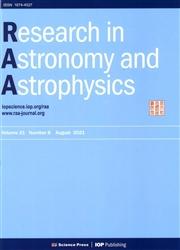基于波导模理论的VLF夜间多模干涉现象观察与分析
IF 2.8
4区 物理与天体物理
Q3 ASTRONOMY & ASTROPHYSICS
引用次数: 0
摘要
甚低频(VLF)信号在地面-电离层之间传播。多模干扰在夜间传播时,会使相位随距离呈现振荡变化,导致接收到的VLF信号出现异常。本文以俄罗斯阿尔法导航系统在山东青岛接收到的VLF信号为研究对象,探讨VLF信号传播中的多模干扰问题。根据VLF信号的相位变化,分析了多模干涉现象对相位影响的特点。然而,VLF信号的相位也会受到太阳耀斑爆发时释放的x射线和高能粒子的影响,因此本文对这两种现象进行了研究。得出结论:x射线在夜间对VLF信号的相位没有影响,但高能粒子会影响其相位变化,在研究多模干涉现象时应排除高能粒子的影响。利用甚低频信号在GPS退化或不可用的情况下进行导航定位,可以避免多模干扰的影响,提高定位精度,对甚低频导航系统具有重要的实际意义。本文章由计算机程序翻译,如有差异,请以英文原文为准。
Observation and analysis of VLF nocturnal multimode interference phenomenon based on waveguide mode theory
Abstract Very low frequency (VLF) signals are propagated between the ground-ionosphere. Multimode interference will cause the phase to show oscillatory changes with distance while propagating at night, leading to abnormalities in the received VLF signal. This study uses the VLF signal received in Qingdao City, Shandong Province, from the Russian Alpha navigation system to explore the multimode interference problem of VLF signal propagation. The characteristics of the effect of multimode interference phenomena on the phase are analyzed according to the variation of the phase of the VLF signal. However, the phase of VLF signals will also be affected by the X-ray and energetic particles that are released during the eruption of solar flares, therefore the two phenomena are studied in this work. It is concluded that the X-ray will not affect the phase of VLF signals at night, but the energetic particles will affect the phase change, and the influence of energetic particles should be excluded in the study of multimode interference phenomena. Using VLF signals for navigation positioning in degraded or unavailable GPS conditions is of great practical significance for very low frequency navigation systems as it can avoid the influence of multimode interference and improve positioning accuracy.
求助全文
通过发布文献求助,成功后即可免费获取论文全文。
去求助
来源期刊

Research in Astronomy and Astrophysics
地学天文-天文与天体物理
CiteScore
3.20
自引率
16.70%
发文量
2599
审稿时长
6.0 months
期刊介绍:
Research in Astronomy and Astrophysics (RAA) is an international journal publishing original research papers and reviews across all branches of astronomy and astrophysics, with a particular interest in the following topics:
-large-scale structure of universe formation and evolution of galaxies-
high-energy and cataclysmic processes in astrophysics-
formation and evolution of stars-
astrogeodynamics-
solar magnetic activity and heliogeospace environments-
dynamics of celestial bodies in the solar system and artificial bodies-
space observation and exploration-
new astronomical techniques and methods
 求助内容:
求助内容: 应助结果提醒方式:
应助结果提醒方式:


